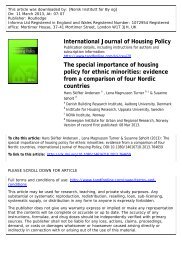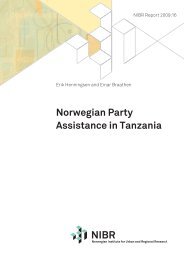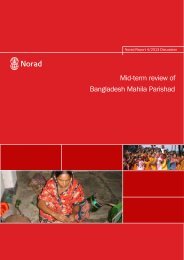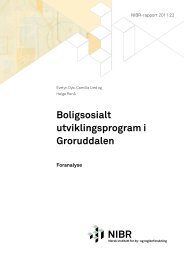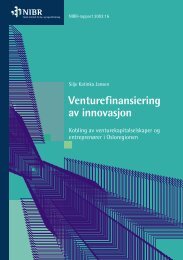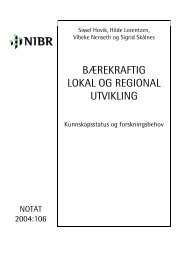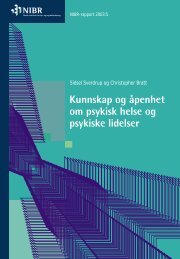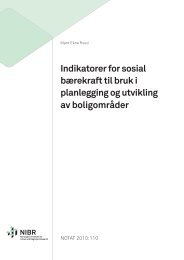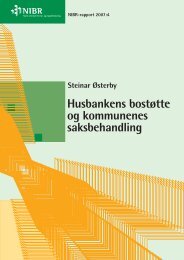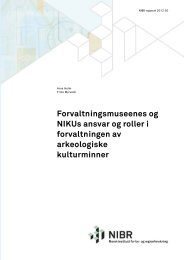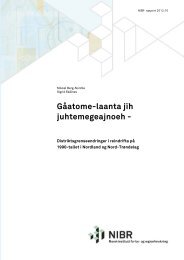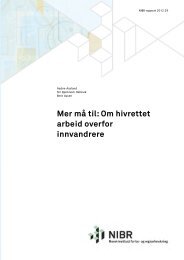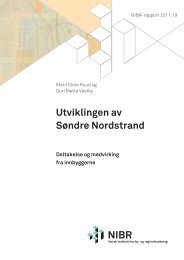18<strong>and</strong> also any strategic planning documents that set out <strong>the</strong> programme vision, werereviewed <strong>and</strong> where possible, any <strong>the</strong>ory <strong>of</strong> change identified.2) Survey- this largely quantitative method is <strong>the</strong> bedrock <strong>for</strong> <strong>the</strong> study because itin<strong>for</strong>ms almost all aspects <strong>of</strong> <strong>the</strong> intervention, especially <strong>the</strong> impact questions. Keycharacteristics <strong>of</strong> <strong>the</strong> graduate cohort <strong>and</strong> key <strong>the</strong>mes from findings capture <strong>the</strong>beneficiaries’ views <strong>and</strong> also <strong>the</strong>ir contribution to broader processes. As proposed by<strong>the</strong> ToR <strong>the</strong> survey provides background in<strong>for</strong>mation on <strong>the</strong> c<strong>and</strong>idates, <strong>the</strong> type <strong>of</strong>organisation/institution <strong>the</strong>y worked <strong>for</strong> be<strong>for</strong>e attending <strong>the</strong> women’s lawdiploma/master, in<strong>for</strong>mation about <strong>the</strong> careers <strong>of</strong> <strong>the</strong> <strong>for</strong>mer students, <strong>the</strong>ir use <strong>of</strong><strong>the</strong> <strong>the</strong>oretical knowledge in <strong>the</strong>ir current work, <strong>the</strong>ir consideration <strong>of</strong> <strong>the</strong> mostuseful aspects <strong>of</strong> <strong>the</strong>ir course in women’s law, <strong>the</strong> impact <strong>of</strong> <strong>the</strong> training as assessedby <strong>the</strong>mselves, examples given <strong>of</strong> how <strong>the</strong>y have used <strong>the</strong>ir knowledge, <strong>the</strong>ir ownoutputs (publications, papers, newspaper, radio, TV, etc), <strong>the</strong>ir level <strong>of</strong> contact witho<strong>the</strong>r <strong>for</strong>mer students, <strong>and</strong> <strong>the</strong>ir opinions about how <strong>the</strong> effect <strong>of</strong> <strong>the</strong> training bestcould be improved. In addition to <strong>the</strong>se questions, we have asked about concreteachievements <strong>and</strong> contributions made to women’s law in particular <strong>and</strong> what kinds <strong>of</strong>networks <strong>the</strong>y are in.Some questions in <strong>the</strong> survey have gone to <strong>the</strong>ir current employers. Employers wereasked to assess <strong>the</strong> usefulness <strong>of</strong> <strong>the</strong> training in <strong>the</strong> work <strong>of</strong> <strong>for</strong>mer participants <strong>of</strong><strong>the</strong> programme as well as <strong>the</strong> usefulness <strong>of</strong> <strong>the</strong> training on policy <strong>for</strong>mulation. In <strong>the</strong>two countries where field work was conducted, we followed up on <strong>the</strong>se issues ininterviews where it was deemed relevant <strong>and</strong> necessary in order to get more feedbackto assess <strong>the</strong> impact. Some <strong>of</strong> <strong>the</strong> questions in <strong>the</strong> survey were open-ended, such asgiving examples <strong>of</strong> how <strong>the</strong> c<strong>and</strong>idates have used <strong>the</strong> knowledge gained <strong>and</strong> <strong>the</strong>iropinions about how training could be improved.The survey questions were <strong>for</strong>mulated by Jones <strong>and</strong> Hellevik based on <strong>the</strong> questionsoutlined in <strong>the</strong> TOR <strong>and</strong> in <strong>the</strong> NIBR tender. Hellevik made <strong>the</strong> technical input into<strong>the</strong> survey instrument used, namely, <strong>the</strong> Easyquest programme. The Easyquestprogramme is a web-based electronic survey instrument which is user friendly, cheap<strong>and</strong> makes <strong>the</strong> client <strong>the</strong> proprietor <strong>of</strong> <strong>the</strong> raw data. Tronstad <strong>and</strong> Aasen acted as testusers <strong>and</strong> gave feed back to <strong>the</strong> test questionnaire <strong>and</strong> <strong>the</strong> questions <strong>and</strong> <strong>the</strong>ir orderin <strong>the</strong> questionnaire was fur<strong>the</strong>r refined be<strong>for</strong>e it was sent out. Hellevik organised <strong>the</strong>final layout <strong>and</strong> technical issues regarding <strong>the</strong> questionnaire <strong>and</strong> it was distributed to181 respondents on November 12, 2012. Two reminders were distributed torespondents be<strong>for</strong>e <strong>the</strong> survey was closed on December 13. The analysis <strong>of</strong> <strong>the</strong> datawas also done by use <strong>of</strong> Easyquest, supplemented by use <strong>of</strong> Excel.Previously <strong>the</strong> poor response rates in <strong>the</strong> MTR h<strong>and</strong>icapped <strong>the</strong> validity <strong>of</strong>questionnaire sent out. The NIBR evaluation team were <strong>the</strong>re<strong>for</strong>e aware that somedecrease in response would be anticipated, which in some cases may be due tomigration <strong>and</strong> HIV/AIDS. The major challenge <strong>the</strong> team anticipated was to get as upto date as possible contact in<strong>for</strong>mation <strong>for</strong> respondents. We <strong>the</strong>re<strong>for</strong>e started <strong>the</strong>work by sending out an early tracer e-mail to all <strong>for</strong>mer students <strong>for</strong> whom we had e-mail addresses, requesting people to reply “Yes” <strong>for</strong> having received <strong>the</strong> e-mail. Thistracer e-mail also allowed us to see which e-mail addresses were out <strong>of</strong> use. Based on<strong>the</strong> results <strong>of</strong> this tracer e-mail, we followed up with <strong>the</strong> in<strong>for</strong>mation manager <strong>of</strong> <strong>the</strong><strong>Centre</strong> <strong>and</strong> <strong>the</strong> local consultant in Harare to find alternative e-mail addresses <strong>for</strong>
those which were not in use. The evaluation team managed to get new e-mailaddresses <strong>for</strong> most people. Of <strong>the</strong> list <strong>of</strong> a total <strong>of</strong> 202 students, 181 was <strong>the</strong> finalnumber <strong>of</strong> students <strong>for</strong> whom we had e-mail addresses (but with many not replyingto <strong>the</strong> tracer email). The response rate <strong>of</strong> <strong>the</strong> survey was 90 people: 87 <strong>for</strong>merstudents <strong>and</strong> 3 employers. In total <strong>the</strong>re was <strong>the</strong>re<strong>for</strong>e a response rate <strong>of</strong> 48,15percent. Such a level <strong>of</strong> response can <strong>the</strong>re<strong>for</strong>e be considered representative <strong>of</strong> <strong>the</strong>graduate cohort, especially given <strong>the</strong> good spread in relation to nationality, gender<strong>and</strong> educational background (i.e. lawyer or non-lawyer).3) Qualitative methods- For impact <strong>and</strong> sustainability we also used qualitative methods.Interviews <strong>and</strong> focus group discussions were qualitative methods used whichprovided important feedback on <strong>the</strong> validity <strong>of</strong> <strong>the</strong> survey <strong>and</strong> vice versa. In<strong>for</strong>mantswere selected intentionally due to particular characteristics especially to do with type<strong>of</strong> work. In particular, findings supplemented those from <strong>the</strong> survey on personal <strong>and</strong>individual impact, as well as <strong>the</strong> institutional level. The total number <strong>of</strong> interviewsconducted was 51, <strong>of</strong> <strong>the</strong>se:The total number <strong>of</strong> graduates individually interviewed was: 20 (9 Zambia, 9Zimbabwe, 2 Kenya, plus one o<strong>the</strong>r not counted as a graduate but who wished to do<strong>the</strong> course).The total number <strong>of</strong> employers interviewed was: 8 (4 Zambia, 4 Zimbabwe- <strong>and</strong> one<strong>of</strong> whom is double-counted because <strong>the</strong>y were also a graduate).O<strong>the</strong>rs, such as partners or key in<strong>for</strong>mants: 23 (4 Zambia, 14 Zimbabwe- including 2University <strong>of</strong> Zimbabwe, 2 at RNE, <strong>and</strong> 5 at SEARCWL itself). This total figure alsoincludes 3 <strong>Regional</strong> Board members (who were interviewed explicitly in that capacity)<strong>and</strong> 2 partners at <strong>the</strong> University <strong>of</strong> Oslo.Topics depended on whe<strong>the</strong>r respondents were graduates, employers, or keyin<strong>for</strong>mants, regional board members <strong>and</strong> so on. Interview schedules took this intoconsideration.In addition 2 groups interviews were conducted: one in Zimbabwe (5 graduates, one<strong>of</strong> whom were interviewed separately) <strong>and</strong> <strong>the</strong> o<strong>the</strong>r in Zambia (4 <strong>of</strong> whom all wereinterviewed). In o<strong>the</strong>r words <strong>the</strong> group interviews added ano<strong>the</strong>r 4 graduates to <strong>the</strong>make an overall total <strong>of</strong> 24 graduates spoken with. In all cases, as mentioned,respondents were intentionally approached <strong>for</strong> interview based on aspects such as<strong>the</strong>ir work.4) Academic sustainability - first, we checked curriculum <strong>and</strong> research outputs, includingteaching <strong>and</strong> academic related publications. The ‘empirical knowledge’ basis <strong>of</strong> <strong>the</strong><strong>Centre</strong> was checked concerning <strong>the</strong> quality <strong>of</strong> research outputs <strong>and</strong> curriculadevelopment. This was done in conjunction with speaking with members <strong>of</strong> <strong>the</strong>regional colloquia responsible <strong>for</strong> course development <strong>and</strong> revision <strong>and</strong> regional‘peers’. This component inevitably overlaps with <strong>the</strong> scope <strong>and</strong> nature <strong>of</strong> networks<strong>and</strong> partnerships in meeting broader change objectives. In addition, we conductedinterviews with key actors at <strong>the</strong> <strong>Centre</strong>, <strong>and</strong> also selected regional board members;RNE, Norad staff consulted; <strong>and</strong> also o<strong>the</strong>r partners, such as <strong>the</strong> University <strong>of</strong> Oslo;<strong>and</strong> significant institutional collaborators (see below).19



